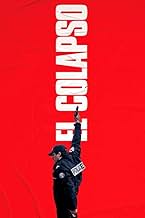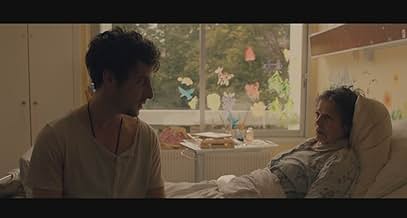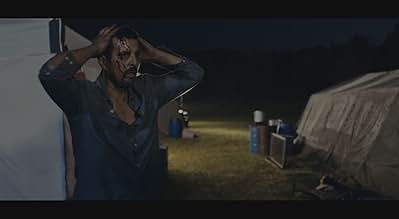IMDb-BEWERTUNG
7,8/10
2955
IHRE BEWERTUNG
Was würde mit unserer Gesellschaft passieren, wenn das System morgen zusammenbrechen würde?Was würde mit unserer Gesellschaft passieren, wenn das System morgen zusammenbrechen würde?Was würde mit unserer Gesellschaft passieren, wenn das System morgen zusammenbrechen würde?
- Auszeichnungen
- 2 Nominierungen insgesamt
Folgen durchsuchen
Empfohlene Bewertungen
L'Effondrement is about collapse of the civilization. It isn't crystal clear what caused the collapse. There might be a few hints, but basically all supply chains fall apart and with them, everything.
What I love about this mini-series is that we might experience something exactly like this*. The show catches panic, desperation and denial very well.
Each episode is dedicated to a different person or a group that experiences collapse in a different way. Some of them end relatively well. Some are a tragedy. A few go sideways...
*except Ep. 05, there are safety systems designed for situations.
What I love about this mini-series is that we might experience something exactly like this*. The show catches panic, desperation and denial very well.
Each episode is dedicated to a different person or a group that experiences collapse in a different way. Some of them end relatively well. Some are a tragedy. A few go sideways...
*except Ep. 05, there are safety systems designed for situations.
Abstract
Eight exciting chapters, eight moments and extreme situations derived from a sudden? crisis that leaves the planet without supplies.
Review
Starting on J-Day, there is a sudden global collapse whereby the supply of food, energy and other inputs is cut off.
This French miniseries addresses in each chapter distressing situations that arise from that event whose nature we ignore.
But it does not do it in any way: each one of its nervous chapters lasts only around 20 minutes and is filmed in real time with a handheld camera and in a single sequence shot. And it is not a quirk of style: the dramatic effect is prodigious and the technical expertise in the realization in some is astonishing.
The series does not fall into the usual Manichean nihilism of apocalyptic dystopias because, although human miseries appear in each chapter, the result of desperation for survival, gestures of solidarity and collaboration are not absent either.
The situations dealt with are individual or collective, often dilemmatic, with very different locations, different characters (with very few exceptions and few links between them) and with strong social and class notes, but without falling into the cliché. Overall the pacing is distressing but never hysterical, and the filmmakers have a knack for making chapters quite different and with room for surprise.
Filmed in 2019, this dystopia directed by Jérémy Bernard, Guillaume Desjardins and Bastien Ughetto (who stars in one of the most terrifying episodes) is prescient in some aspects of the global coronavirus crisis and undoubtedly related to the prevailing capitalist modes of production.
Pay attention to the final titles of each chapter. If you pay attention, you will see that they are revealing.
Eight exciting chapters, eight moments and extreme situations derived from a sudden? crisis that leaves the planet without supplies.
Review
Starting on J-Day, there is a sudden global collapse whereby the supply of food, energy and other inputs is cut off.
This French miniseries addresses in each chapter distressing situations that arise from that event whose nature we ignore.
But it does not do it in any way: each one of its nervous chapters lasts only around 20 minutes and is filmed in real time with a handheld camera and in a single sequence shot. And it is not a quirk of style: the dramatic effect is prodigious and the technical expertise in the realization in some is astonishing.
The series does not fall into the usual Manichean nihilism of apocalyptic dystopias because, although human miseries appear in each chapter, the result of desperation for survival, gestures of solidarity and collaboration are not absent either.
The situations dealt with are individual or collective, often dilemmatic, with very different locations, different characters (with very few exceptions and few links between them) and with strong social and class notes, but without falling into the cliché. Overall the pacing is distressing but never hysterical, and the filmmakers have a knack for making chapters quite different and with room for surprise.
Filmed in 2019, this dystopia directed by Jérémy Bernard, Guillaume Desjardins and Bastien Ughetto (who stars in one of the most terrifying episodes) is prescient in some aspects of the global coronavirus crisis and undoubtedly related to the prevailing capitalist modes of production.
Pay attention to the final titles of each chapter. If you pay attention, you will see that they are revealing.
This excellently made short series is atmospherically dense like Black Mirror.
But it's not about the consequences of technological development.
At least not directly. But about the collapse of the social order, the survival of people while everything around them no longer exists.
Each individual episode represents a certain period of time, e.g. episode 7, which shows a woman surviving 50 days after the collapse of society (one of the best episodes, by the way). The exception is the last episode 8, which shows the events 5 days before the collapse.
A much too unknown series that left a deep impression on me. Unfortunately the series only consists of 8 episodes, each about 15-25 minutes short. The short duration of the episodes is an advantage when designing a captivating episode. I hope there will be a new season with more episodes at some point. With episodes this short, there should be at least 15 episodes.
In terms of production (camera, editing, lighting, sound / music), the consequences are all equal and well done. This is an example of what the European film industry can offer.
Presumably some self-proclaimed ''patriots'' (Neoliberals with great love for the rich) who are delusional will see this series as socialist propaganda.
Each individual episode represents a certain period of time, e.g. episode 7, which shows a woman surviving 50 days after the collapse of society (one of the best episodes, by the way). The exception is the last episode 8, which shows the events 5 days before the collapse.
A much too unknown series that left a deep impression on me. Unfortunately the series only consists of 8 episodes, each about 15-25 minutes short. The short duration of the episodes is an advantage when designing a captivating episode. I hope there will be a new season with more episodes at some point. With episodes this short, there should be at least 15 episodes.
In terms of production (camera, editing, lighting, sound / music), the consequences are all equal and well done. This is an example of what the European film industry can offer.
Presumably some self-proclaimed ''patriots'' (Neoliberals with great love for the rich) who are delusional will see this series as socialist propaganda.
The episodes of this tv series talk about the collapse of the system. Money worth nothing and people fight for gas and food trying to survive. So far so good!
The "problem" is that everything is extremely predictable. What do you expect that will happen if the system collapses? People in panic , killing each other for food and gas, right? Well , exactly that is happening. There is no originality. Nothing in the story that justifies making a tv show. They have nothing new to say , they just repeat things we have already seen in all post apocalyptic shows and films.
But is that necessarily bad? I am not sure. There is a documanteristic feel in the episodes that make you think that you are watching the news and not a tv show and the fact that nothing unpredictable happens makes that feel even more intense. You feel like these are real people, out there fighting for their lives! You feel like it's something that is happening now. For that feel alone it's a show worth watching. It's a show that tries to be real in an era when every show tries to be as fake as possible. That is its originality. That is its justification!
The "problem" is that everything is extremely predictable. What do you expect that will happen if the system collapses? People in panic , killing each other for food and gas, right? Well , exactly that is happening. There is no originality. Nothing in the story that justifies making a tv show. They have nothing new to say , they just repeat things we have already seen in all post apocalyptic shows and films.
But is that necessarily bad? I am not sure. There is a documanteristic feel in the episodes that make you think that you are watching the news and not a tv show and the fact that nothing unpredictable happens makes that feel even more intense. You feel like these are real people, out there fighting for their lives! You feel like it's something that is happening now. For that feel alone it's a show worth watching. It's a show that tries to be real in an era when every show tries to be as fake as possible. That is its originality. That is its justification!
Ranging from episodes of fifteen minutes to twenty seven minutes this eight-parter told tales of disparate people and groups tenuously linked in some of the episodes.
The end was no longer nigh, it had happened. Capitalist society had broken down and the programmes explored various characters' reactions to survive the cataclysm.
Few of the episodes engaged me. However both the storyline and the acting in the episode set in the old folks home were a definite winner. I found the final episode the weakest of all as I could not believe either in the subversives nor in their acceptance by the television debate programme.
I also found the garage episode far fetched. A baseball bat would never have kept the ravening hordes away nor could it have stopped them sacking the place.
All in all an easy watch to fill in some time.
The end was no longer nigh, it had happened. Capitalist society had broken down and the programmes explored various characters' reactions to survive the cataclysm.
Few of the episodes engaged me. However both the storyline and the acting in the episode set in the old folks home were a definite winner. I found the final episode the weakest of all as I could not believe either in the subversives nor in their acceptance by the television debate programme.
I also found the garage episode far fetched. A baseball bat would never have kept the ravening hordes away nor could it have stopped them sacking the place.
All in all an easy watch to fill in some time.
Top-Auswahl
Melde dich zum Bewerten an und greife auf die Watchlist für personalisierte Empfehlungen zu.
- How many seasons does The Collapse have?Powered by Alexa
Details
- Erscheinungsdatum
- Herkunftsland
- Offizieller Standort
- Sprache
- Auch bekannt als
- L'Effondrement
- Weitere beteiligte Unternehmen bei IMDbPro anzeigen
Zu dieser Seite beitragen
Bearbeitung vorschlagen oder fehlenden Inhalt hinzufügen


![Bande-annonce [OV] ansehen](https://m.media-amazon.com/images/M/MV5BNWY2M2EzYTYtYWVlZS00OTc0LTg4MTQtMGJjZmQzMzA1N2I3XkEyXkFqcGdeQXRyYW5zY29kZS13b3JrZmxvdw@@._V1_QL75_UY281_CR81)




























